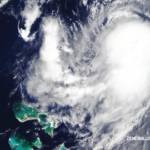Six weeks after Maria tore through Puerto Rico, the island is struggling to pick up the pieces, and about two-thirds of its residents remain without power.
The territory declared bankruptcy earlier this year and the storm has plunged its economy into deeper uncertainty, exacerbating the Medicaid crisis.
“I am worried about my patients. I am worried about myself. I have a family and obligations,” said Ivan Gonzalez-Cancel, a heart surgeon at Centro Cardiovascular de Puerto Rico, who said he expects the territory to run out of Medicaid money in February.
“I have been talking to many people for years saying, ‘We need a Plan B,'” Gonzalez said. “They are counting on that money.”
The hurricane is one of several massive disasters to hit the United States over the past three months. Congress has approved more than $51 billion in emergency aid since September and will consider another aid request this month.
Carlos Mercader, a spokesman for the governor, said he hoped federal attention to Puerto Rico’s hurricane woes would lead to a longer-lasting fix for its Medicaid problems.
But Joe Antos, a health care economist at the American Enterprise Institute, said that might be a tough sell in Washington, given the island’s long list of needs. “They have had no traction on this issue, whatsoever, for decades,” Antos said. “This is just a very bitter frosting on a really tough cake.”


